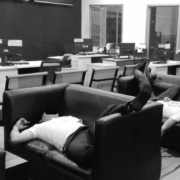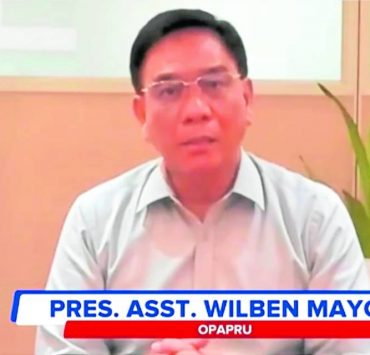Breaking the La Salle stereotype
From being the valedictorian in his elementary school in Negros Oriental province, Mark Vincent Emit became a high school dropout after he joined a group whose members influenced him to cut classes.
In 2002, he was 17 years old when he watched on his neighbor’s TV the wake of actor Rico Yan held on the La Salle Green Hills (LSGH) campus in Mandaluyong City.
“There was an aerial shot showing how Yan’s coffin was brought to the LSGH gym which was all green and shaped like a siopao (steamed bun),” Emit said.
“The school is beautiful,” he recalled telling his relatives as he also expressed his wish to study there.
But since Emit was from a broken family that was not well-off, his relatives told him to stop dreaming.
As if by fate two weeks later, his mother who was then working in Manila told him that LSGH was offering full scholarships to underprivileged individuals.
‘Probinsyano’ struggles
Emit immediately went to Manila, hoping to enroll only to learn that he must wait for another year since the LSGH adult night high school program was for those age 18 and above.
When he was finally accepted, the “probinsyano” found himself struggling to socialize and make friends while adjusting to an entirely different culture and community whose members were from the affluent class.
There was also the language barrier while even his style of clothing always seemed to miss the trend. “I probably had the most outdated clothes among the students there,” Emit said.
“I didn’t think about it too much and I was able to cope with the struggles. I just reminded myself that my only goal was to finish my studies,” he added.
In 2007, Emit graduated at the top of his high school class as he went on to obtain a bachelor’s degree in business administration at De La Salle College of Saint Benilde under another full scholarship.
After earning master’s and doctorate degree from two other universities, he now teaches high school students in various learning institutions, including LSGH.
Met with disbelief
According to Rey Ducay, the school’s assistant principal and head of the alternative education office, their free alternative education program is not widely known although they have been offering it for the last 45 years.
“When we say that there’s free education here, a lot of people are in disbelief and some would even raise their eyebrows,” he said. “Because when you say La Salle, you would think it’s expensive, right? But the target for alternative education really is the poor and marginalized.”
The LSGH alternative education program has three components: the alternative learning system (ALS), adult night high school, and technical vocational education and training (TVET).
Under ALS, the school offers a basic literacy program for nonreaders, in addition to a grade school education for those age 12 and above, or a high school education for those 16 years and older who have not finished Grade 10.
The adult night high school, on the other hand, is for those hoping to complete their senior high school education or Grades 11 and 12 while TVET is for high school graduates who want to enroll in courses registered with the Technical Education and Skills Development Authority (Tesda).
Ducay said that the ALS was not just being offered on the LSGH campus but also in different partner institutions like the Bureau of Jail Management and Penology (BJMP) in Mandaluyong City, the Department of Social Welfare and Development sanctuary, Jose Fabella Center, and Fairview Episcopal Resurrection Church.
There are online, face-to-face and night classes, depending on the students’ program.
‘Authentic mission’
At BJMP Mandaluyong, for example, persons deprived of liberty interact online with the teacher in charge who is at LSGH.
Ducay said that teachers assigned to the program were not volunteers but receive a salary.
As for funding, “we look for benefactors. We ask organizations, even individuals who would be generous enough to sponsor a student,” he said. “What we have here is an authentic mission. You need not worry that what you donate will not go to those who need it.”
Being able to serve the poor is an opportunity that not everyone gets, Ducay also pointed out.
“I sleep well at night because I know I was able to help others. That’s every night for us—the feeling that you know you have been an instrument of God,” he said.
Inspired by drivers, maids
For Bro. Augustine “Gus” Boquer who conceptualized the school’s alternative education program, the idea was inspired by the sight of drivers and househelpers waiting for the students in their care to be dismissed from class.
“So they’re just here, idle and waiting,’’ he said, referring to the “sundo” or the helpers who fetch the youngsters. “Why not give them education? And then [we] found out many of them were not high school graduates. So that’s how it started.”
From just 17 students, the LSGH program has served around 26,000 student beneficiaries since 1978. For this school year, it has over 900 students from ages 14 to 60. In the previous school year, the oldest graduate was 74 years old.
“In terms of age requirement, as old as they can be as long they want to finish school,” Ducay said.
Origins
In TVET, the student population is composed mostly of high school graduates in their 20s who are working and want to brush up on their skills for better job opportunities. But there are also housewives enrolled in the school’s dressmaking TVET course.
“If you trace the origin of La Sallian education, it’s really streetchildren, those who were incarcerated were actually the ones taught by St. La Salle. Not really the rich people,” Ducay said.
For this reason, one of his visions as head of the alternative education program was to create a “different image for LSGH,” not just among outsiders but also among its students and their parents.
“We want them to know that the school of their children is helping poor people,” Ducay said.
According to him, there were many learners who dropped out for various reasons, including financial problems, while others had been traumatized by their school experience.
“I would like to express to them that we have here in La Salle Green Hills, a school for them … If you wish to have another shot, another chance to finish your education, you are welcome here. They can enroll with us,” he added. INQ
















